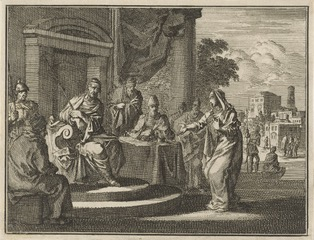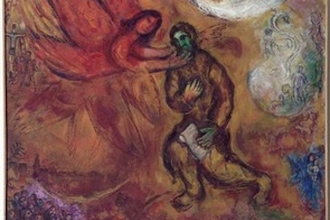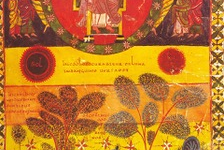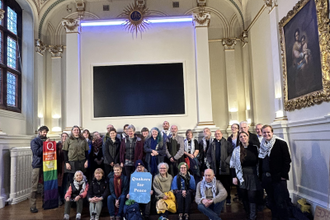Sunday Reflection with Canon Robin Gibbons: October 19th 2025

Gelijkenis van de rechter die wordt lastiggevallen door een klagende vrouw. Wiki Image
Twenty ninth Sunday of the Year
I asked myself, what three things do I take from our readings this Sunday? The answer is simple, not so much based on any great exegesis or theological insight but on the immediate things that emerge for me in each of the three readings, and it is these reflections I shall share with you:
Firstly, I would wish to have a better appreciation of the gift of Holy Scripture. As the second letter of Timothy points out, use the scriptures wisely by knowing the differences between what is instructive, what constitutes the revelation of the Oracles of God in a direct manner, from those utterances and writings that are mainly historical data or descriptive material, but above all I would pray for the gift of Holy Wisdom , that I may…'have known [the] sacred scriptures, which are capable of giving you wisdom for salvation through faith in Christ Jesus'. (2 Tim 3:15)
This is something we need to take far more seriously, relearn to love the scriptures as a guide and strength for our journey as Catholics. I am grateful for the way I learnt about 'lectio divina' in my monastic training, to let the Word of the Scriptural text enter my sloul and imagination, that by mediating and reflecting on it something emerges to guide, help and engage me, but most importantly become part of my life.
The second would be a wish, to be as steadfast as Moses, with the added bonus of supporting friends, perhaps not quite as we find him in our first reading , trying to gain a victory in battle. Yet the inference is clear to me, God is faithful to the promise made to Abraham, Sarah and their descendants in faith, but through Jesus , in the New Covenant, that fidelity is extended freely to all humanity in every age. So this second take of mine is really about the relationship Moses has with God, but also the care and love Moses has for Joshua and Israel. Here before me is that great commandment, to love the Lord with heart, soul and mind and my neighbour as ,myself, and to do this in any circumstance of my life.
The third take is a bit more complicated because we need to read it carefully. The way into understanding is that very first phrase of Luke; 'Jesus told his disciples a parable about the necessity for them to pray always without becoming weary'.(Lk 8:1) The two characters, the dishonest Judge and the importunate widow are placed in the tale by Jesus to show that God , who is just and good, will always hear our pleadings and prayers even if we too are like the widow, being annoying, persistent, difficult and stubborn in the way we talk to the Holy One. This really gives every one of us hope, the dynamic of this parable is more about persistence in faithfulness more than anything else. Even if we are finding our faith difficult, or as happens prayer seems a burden or boring or just too much, Jesus is telling us not to give up. It doesn't matter how, it seems to me he is saying, it's the direction of your prayer that matters here, towards God. It can be short or sweet, verbose or poetic, quiet or noisy, full of feeling or arid, the key is carry on trying. We might not have the right words, or because of events be in a muddle, but as the motto of St John Henry Newman shows us, 'cor ad cor loquitor' the heart speaks, in our case, to the heart of God where words are too deep for us to recognise, but the simplicity of saying 'help me' means everything. It is as St Francis de Sales taught, the silent conversation with God in our heart. Amen
Lectio
St Francis de Sales
Prayer brings our mind into the brightness of divine light, and exposes our will to the warmth of divine love. Nothing else can purge the mind from its ignorance, and our will from its depraved affections. It is a blessed fountain which, as it flows, revives our good desires and causes them to bring forth fruit, washes away the stains of infirmity from our soul, and calms the passions of our hearts. Above all, I would recommend mental prayer, the prayer of the heart; and that drawn from the contemplation of our Savior's Life and Passion.
Thomas Keating OCSO
Divine Therapy and Addiction
"Hence, it's obvious to see why in AA the community is so important; we are powerless over ourselves. Since we don't have immediate awareness of the Higher Power and how it works, we need to be constantly reminded of our commitment to freedom and liberation. The old patterns are so seductive that as they go off, they set off the association of ideas and the desire to give in to our addiction with an enormous force that we can't handle. The renewal of defeat often leads to despair. At the same time, it's a source of hope for those who have a spiritual view of the process. Because it reminds us that we have to renew once again our total dependence on the Higher Power. This is not just a notional acknowledgment of our need. We feel it from the very depths of our being. Something in us causes our whole being to cry out, "Help!" That's when the steps begin to work. And that, I might add, is when the spiritual journey begins to work. A lot of activities that people in that category regard as spiritual are not communicating to them experientially their profound dependence on the grace of God to go anywhere with their spiritual practices or observances. That's why religious practice can be so ineffective. The real spiritual journey depends on our acknowledging the unmanageability of our lives. The love of God or the Higher Power is what heals us. Nobody becomes a full human being without love. It brings to life people who are most damaged. The steps are really an engagement in an ever-deepening relationship with God. Divine love picks us up when we sincerely believe nobody else will. We then begin to experience freedom, peace, calm, equanimity, and liberation from cravings for what we have come to know are damaging-cravings that cannot bring happiness, but at best only momentary relief that makes the real problem worse."


















